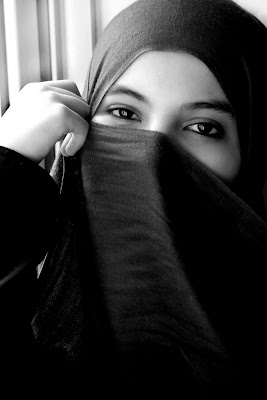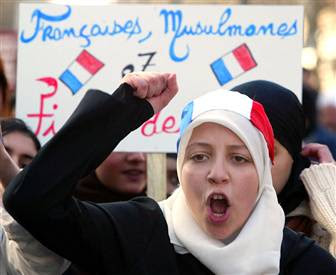 This was my primary motivation for reacting strongly, and even publishing an essay in l'Ancrage (an eclectic literary journal founded by some fellow grad students and myself), against France's stand on the Muslim head-scarf. It seems incontrovertible to me that whenever the State has attempted to enforce belief, thought, or even word (aside from fighting words, yelling fire in a theater, the situation where a locution's illocutionary force poses a real-life threat to another's freedom), the results have been disastrous, oppressive and violent. Granted, France is enforcing a behavior and not a thought or a word, but in all honesty it WAS aimed essentially at the growing and Muslim population within its borders, and WAS essentially a message of state rejection of certain beliefs.
This was my primary motivation for reacting strongly, and even publishing an essay in l'Ancrage (an eclectic literary journal founded by some fellow grad students and myself), against France's stand on the Muslim head-scarf. It seems incontrovertible to me that whenever the State has attempted to enforce belief, thought, or even word (aside from fighting words, yelling fire in a theater, the situation where a locution's illocutionary force poses a real-life threat to another's freedom), the results have been disastrous, oppressive and violent. Granted, France is enforcing a behavior and not a thought or a word, but in all honesty it WAS aimed essentially at the growing and Muslim population within its borders, and WAS essentially a message of state rejection of certain beliefs.
(Image from: http://www.flickr.com/photo_zoom.gne?id=165980053&size=l)
The problem is that the components of self-identification and religious belief are so intermingled and imbricated that such a policy of rejection, so ostensibly aimed at promoting integration (by making the public school a "neutral" place of NON-religion and religious INtolerance rather than a neutral place of tolerance for a multiplicity of religions), can only produce the opposite of its stated intent. In fact, the logical fallacy of the laws intent is to assume that differences of religion automatically and inexorably lead to the impossibility of neutrality (i.e. always produce intolerance). This assumption is a false premise since peace and respect of religious beliefs IS possible and a peace resulting from the order imposed by controlling violent behaviors can be and is the norm (in France and in the US) without needing to infringe upon thought, word, or non-violent religious practice.
So do I like the veil? Of course not! I don't think it's right to teach a woman that any part of her body is shameful, I think it's wrong for men to impose dominion over women to any degree (which is the net effect of the clothing standard whatever the stated purpose may be--it reinforces the power of men by re-affirming the subaltern status of women--marking them in a way that makes them unequal to males of the same faith) let alone claim ownership of another human being (which is what some extreme versions of the veil amount to), especially in cases where the free will of the woman in question did not choose to wear it (which is, sadly, the not uncommon case with some women in France who would be under threat of physical harm from fathers or brothers were they to choose "Western" garb). In a very real way, the veil can be like a prison, a corporeal and constant reminder of limits, boundaries, circumscription of the body, will, and mind. The very idea behind the veil is repulsive to me, because it relegates women to a second class, and is at its root the same idea which would grant a father the right to withhold an education from his daughters, a husband the right to threaten a male obstetrician attending to the Muslim wife at difficult moment in labor, a brother the right to kill a sister to save the "honor" of the family.
But let's really think openly about it: is the veil REALLY harmful? Does it really do PHYSICAL harm? Is it psychologically shocking in the same way that it would be punishable by law for someone to verbally abuse their child? And if there should be a law against that, shouldn't there also be a law against a team captain shaving a new teammate's head as part of an initiation ritual, or against a mother threatening her child with spanking if the child ever gets a nose ring? As much as I am against any force requiring any woman to wear a veil, I don't see any practical way for the law to intervene. And for those women who DO choose to wear a veil for themselves, should the government REALLY be protecting them from themselves, and thereby imposing their own morality on such women? Of course it shouldn't. For these women, the veil is no more harmful than high heels and lingerie (which, when you think about it, are perfectly analogous instruments of  male domination in many contexts!)
male domination in many contexts!)
(Image from: http://www.msnbc.msn.com/id/4106422/)
The current resurgence of veil wearing in France, resurgence against which the 2004 law was a reaction, is really part of a larger cultural phenomenon among immigrant populations in which the first generation assimilate but are never perfectly integrated, but the second generation, perceiving a more or less latent rejection from the host country (of which they are now citizens!), reacts against the rejection by reaffirming their ethnically different heritage and adopting old-world practices even more strongly than their tradition ever did. The two girls who kicked off the debate in France, whose removal from a high school for refusing to participate in a swim class for fear it would require them to take off their veils, are prime examples of this phenomenon. Their father, a non-practicing Jew, certainly did not maintain the practice of veil wearing, it's only upon a visit to their Moroccan grandmother that the two girls noted a previous tradition of veil wearing, and then claimed it as their own. In a way, this concentration of reactions to rejection among the second generation of immigrant populations mirrors Freud's conception of the Return of the Repressed. It is in this context that I roundly condemned the French for this law. For all of their dismissal and marginalization of the proudly xenophobic Front National (extreme right political party in France), the French have nevertheless acted out of a strictly identical fear of cultural dissolution. And I predicted that such a will to repress the religious practices, and the self-identifications of those that adhere to such religions, would produce the opposite effect intended by the law (which aims at better integration).
My prediction before the law passed was specifically that Moslems would react by increasingly withdrawing from the public sphere, and from public education, and would educate their children in their own way--which could well be more dangerous--in which they would learn not how tolerantly irreligious the French public sphere is, but rather how much the French hate them and how justified they are in retaliating. Although new private Islamic schools have not increased at the pace I predicted, the suburban riots of 2006 (which the press were quick to claim were carried out by the poor--and please ignore the shouts of Allah Al Akbar!) have borne me out quite well, don't you think?
Comments
"So do I like the veil? Of course not! I don't think it's right to teach a woman that any part of her body is shameful..."
I am not ashamed of my chest or any other part of me, but that doesn't mean I want to show them off in public! While I don't know a whole lot about the wearing of the veil or the reasons behind it, I believe I may be seeing a perspective here that you may not have thought of. For me, modesty in dress and behavior is really important. I believe that the body is sacred and not to be flaunted. Perhaps many muslim women feel this way about their faces as well. They are not ashamed--they are proud! (Maybe "proud" isn't quite the right word. Maybe a better word would be "respectful".) I understand that many muslim women don't have much of a choice in hte matter, but I also believe that there must be many out there who choose to wear the veil because they believe it is the right thing to do.